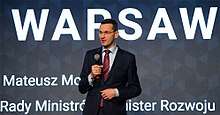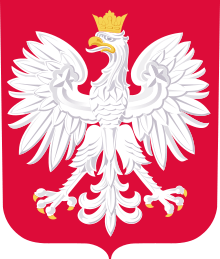Mateusz Morawiecki
| Mateusz Morawiecki | |
|---|---|
.jpg) | |
| 17th Prime Minister of Poland | |
|
Assumed office 11 December 2017 | |
| President | Andrzej Duda |
| Deputy |
Piotr Gliński Jarosław Gowin Beata Szydło |
| Preceded by | Beata Szydło |
| Minister of Finance | |
|
In office 28 September 2016 – 9 January 2018 | |
| Prime Minister | Beata Szydło |
| Preceded by | Paweł Szałamacha |
| Succeeded by | Teresa Czerwińska |
| Minister of Development | |
|
In office 16 November 2015 – 9 January 2018 | |
| Prime Minister | Beata Szydło |
| Preceded by | Maria Wasiak (Infrastructure and Development) |
| Succeeded by | Jerzy Kwieciński (Investments and Development) |
| Personal details | |
| Born |
Mateusz Jakub Morawiecki 20 June 1968 Wrocław, Poland |
| Political party | Law and Justice |
| Spouse(s) | Iwona Morawiecka |
| Children | 4 |
| Relatives | Kornel Morawiecki (Father) |
| Education |
University of Wrocław (BA) Wrocław University of Science and Technology Wrocław University of Economics (MBA) University of Hamburg University of Basel (MAS) |
| Website | Official website |
Mateusz Jakub Morawiecki (born 20 June 1968) is the 17th and current Prime Minister of the Republic of Poland. In addition he is a Polish historian, economist.
He previously served in the cabinet of Prime Minister Beata Szydło as Deputy Prime Minister, Minister of Development, and Minister of Finance.
In 2007–15 Morawiecki was chairman of Bank Zachodni WBK.
Early life and education
Mateusz Morawiecki was born 20 June 1968 in Wrocław, Poland, to Kornel Morawiecki, physicist and Fighting Solidarity leader, and his wife Jadwiga.
At age 12 Morawiecki was already active in the Polish anti-communist movement, duplicating illegal political leaflets. In August 1980 he pasted a poster edition of the Lower Silesia Bulletin all over Wrocław. The poster listed the Gdańsk Demands and, in their support, called for a general strike on Poland's Baltic Sea coast. After martial law was declared in 1981, he printed and distributed underground Solidarity magazines.
Despite repeated arrests and beatings by Poland's Security Service (Służba Bezpieczeństwa, SB), until the late 1980s he continued taking part in political demonstrations. He edited the Lower Silesia Bulletin and was active in the Independent Students' Association. In 1988 and 1989 he participated in occupation strikes at the University of Wroclaw. He co-organized the Club for Political Thought, "Free and Solidary".
Morawiecki is an alumnus of the University of Wrocław (history, 1992), Wrocław University of Technology (1993), Wrocław University of Economics (Business Administration, 1995), the University of Hamburg (European Law and Economic Integration, 1995–97), and the University of Basel (European Studies, 1995–97). While at the Wrocław University of Technology, he studied abroad at Central Connecticut State University and completed an advanced executive program at Northwestern University's Kellogg School of Management.
Career
In 1991 Morawiecki began work at Cogito Company and co-created two publishing firms, Reverentia and Enter Marketing-Publishing. That same year he co-founded the magazine Dwa Dni (Two Days), later becoming editor-in-chief.
In 1995 he completed an internship at Deutsche Bundesbank in credit analysis, financial restructuring, banking supervision, and financial market supervision. In 1996–97 he conducted banking and macroeconomic research at the University of Frankfurt. In 1998, as deputy director of the Accession Negotiations Department in the Committee for European Integration, he oversaw and participated in numerous areas, including finance, of the negotiations for Polish accession to the European Union.
With Frank Emmert, he co-authored the first textbook on The Law of the European Union published in Poland.
From 1996 to 2004 Morawiecki lectured at the Wrocław University of Economics, and from 1996 to 1998 also at the Wrocław University of Technology. He sat on policy committees at many institutions of higher education. From 1998 to 2001 he was a member of the supervisory boards of the Wałbrzych Power Company, Dialog (a local telephone-service provider), and the Industrial Development Agency. From 1998 to 2002 he was a member of the Lower Silesian Regional Assembly.
From November 1998 Morawiecki worked for Bank Zachodni WBK, Santander Group, where he began his career as deputy chair of the supervisory board, and supervisor of the economic analysis bureau and the international trade department. In 2001 he became managing director and a member of the board. In 2007–15 Morawiecki was chairman of Bank Zachodni WBK.
From 16 November 2015 Morawiecki was Deputy Prime Minister and Minister of Development in Prime Minister Beata Szydło's cabinet. Until 2016 he was a political independent. In March 2016 he joined the Law and Justice party.
Minister of Finance (2016–17)

On 28 September 2016 Morawiecki was appointed Poland's finance minister and became one of the most powerful members of Beata Szydło’s government, in charge of budget, government finances, European Union funds, and overall economic policy.[1]
Earlier the same year, he had outlined an ambitious Plan for Responsible Development, known colloquially as the "Morawiecki Plan",[2] aimed at stimulating economic growth and raising revenues for generous government plans, including “Family 500+” child benefits for all families with two or more children.
On 18–19 March 2017 Morawiecki took part in a meeting of G20 finance ministers in Baden-Baden, as Poland's first-ever representative to that summit.[3][4]
Prime Minister (2017–present)
.jpg)
.jpg)
On 8 December 2017 Morawiecki was named Prime Minister of Poland,[5] and three days later he was sworn into office. In his first major parliamentary address, he pledged “continuity” rather than change.[6]
In January 2018, following a racist incident in Warsaw, Morawiecki declared: "There is no place in Poland for racism. The attack on a girl because of her skin color deserves the strongest condemnation. We shall do everything to make Poland safe for everyone."[7]
In early 2018 both chambers of the Polish parliament (the Sejm and Senate) adopted an Amendment to the Act on the Institute of National Remembrance criminalizing the ascription to Poles collectively of complicity in World War II Jewish-genocide-related or other war crimes or crimes against humanity that had been committed by the Axis powers, and condemning use of the expression, "Polish death camp".[8][9][10] The law sparked a crisis in Israel–Poland relations.[11]
At the Munich Security Conference on 17 February that year, Morawiecki said "it is not going to be seen as criminal to say that there were Polish perpetrators, as there were Jewish perpetrators, as there were Russian perpetrators, as there were Ukrainian perpetrators, not only German perpetrators."[12][13] His remark roused controversy and prompted criticism by prominent Israeli politicians, including Israeli Prime Minister Benjamin Netanyahu[14][15] and Israeli President Reuven Rivlin.[16] The crisis was resolved in late June that year when the Polish and Israeli prime ministers issued a joint communiqué endorsing research into the Jewish Holocaust and condemning the expression, "Polish concentration camps".[17]
In March 2018 a new Polish law took effect, banning nearly all commerce on Sundays, with supermarkets and most other retailers closed Sundays for the first time since liberal shopping laws were introduced in the 1990s. The law had been passed by the Law and Justice party with Morawiecki's support. [18][19][20][21]
In July 2018 Morawiecki said he "will not rest" until "the whole truth" of the World War II-era massacres in Volhynia and Eastern Galicia have been explained. Many Poles and Ukrainians were killed in mutual massacres.[22]
Other posts
- Ex-officio member, Board of Governors, Asian Infrastructure Investment Bank (AIIB)[23]
- Ex-officio member, Board of Governors, International Monetary Fund (IMF), [24]
Honors
In 2008 Morawiecki was made Honorary Consul of the Republic of Ireland in Poland. In 2013 he was awarded the Cross of Freedom and Solidarity. He has received many other distinctions from economic clubs, universities, publishing houses, and cultural institutions.
Personal life
Morawiecki is married to Iwona Morawiecka, with whom he has four children.[25][26]
Two of his aunts married Jewish men and converted to Judaism. One aunt was saved during the Jewish Holocaust by a Righteous among the Nations.[27]
State-visits gallery
- Morawiecki with Emmanuel Macron, Brussels 2017
.jpg)
.jpg)
References
- ↑ "Polish reshuffle puts sights on prime minister". POLITICO. 29 September 2016. Retrieved 21 October 2016.
- ↑ "Trillions needed to modernise Poland: deputy minister". Radio Poland. 30 September 2016. Retrieved 21 October 2016.
- ↑ "Morawiecki wśród ministrów finansów G20 - Gospodarka - rp.pl". Retrieved 2017-03-31.
- ↑ "Rzeczy, które musisz wiedzieć o szczycie G20 | Ze świata". TVN24 BiS (in Polish). Retrieved 2017-03-31.
- ↑ "Komitet Polityczny PiS desygnował Mateusza Morawieckiego na Premiera". Prawo i Sprawiedliwość. Retrieved 7 December 2017.
- ↑ Michał Broniatowski (December 12, 2017), Poland’s new PM won’t change anything after leadership swap Politico Europe.
- ↑ "No place for racism in Poland, says PM after attack on teen". Radio Poland. Retrieved 7 January 2018.
- ↑ Israel and Poland try to tamp down tensions after Poland’s ‘death camp’ law sparks Israeli outrage, Washington Post, 28 January 2018
- ↑ Israel and Poland clash over proposed Holocaust law, Reuters, 28 January 2018
- ↑ The Controversy Around Poland’s Proposed Ban on the Term “Polish Death Camps”, Smithsonian.com, 29 January 2018
- ↑ News, ABC. "The Latest: Party head: Israel confirms Polish view on Nazis". ABC News. Retrieved 2018-07-07.
- ↑ ""Jewish perpetrators" remark reignites Poland Holocaust dispute". CBS News. 19 February 2018.
- ↑ "Polish MP: I hope my prime minister is being stupid and not ruthless". The Jerusalem Post. 19 February 2018.
- ↑ ""Jewish perpetrators" remark reignites Poland Holocaust dispute". Retrieved 2018-07-07.
- ↑ "Benjamin Netanyahu attacks Polish PM for saying Jews were among perpetrators of the Holocaust". The Independent. 18 February 2018.
- ↑ "Polish Embassy in Israel Vandalized After Polish PM's Controversial Remarks". VOA News. 18 February 2018.
- ↑ "The Latest: Party Head: Israel Confirms Polish View on Nazis". Retrieved 2018-07-07.
- ↑ https://www.usnews.com/news/business/articles/2018-03-11/most-stores-shut-in-poland-as-sunday-trade-ban-takes-effect
- ↑ https://globalnews.ca/news/4076186/poland-sunday-shopping-ban/
- ↑ https://www.rte.ie/news/2018/0311/946597-poland-shopping/
- ↑ http://www.thenews.pl/1/2/Artykul/353341,Stores-closed-as-Poland-phases-out-Sunday-shopping
- ↑ "Polish PM pledges to fight for 'whole truth' of WWII massacres". Radio Poland. 11 July 2018.
- ↑ Board of Governors Asian Infrastructure Investment Bank (AIIB).
- ↑ Board of Governors International Monetary Fund (IMF).
- ↑ Mateusz Morawiecki – od rewolucjonisty do milionera i wicepremiera. wyborcza.pl, 12 listopada 2015.
- ↑ "Oto rodzina Morawieckiego. Uchylamy rąbka tajemnicy!". Retrieved 2017-12-09.
- ↑ Poland appoints ex-banker with Jewish roots as prime minister By JTA, 8 December 2017
External links
| Political offices | ||
|---|---|---|
| Preceded by Janusz Piechociński |
Deputy Prime Minister of Poland 2015–2017 |
Succeeded by Beata Szydło |
| Preceded by Maria Wasiak |
Minister of Development 2015–2018 |
Succeeded by Jerzy Kwieciński |
| Preceded by Paweł Szałamacha |
Minister of Finance 2016–2018 |
Succeeded by Teresa Czerwińska |
| Preceded by Beata Szydło |
Prime Minister of Poland 2017–present |
Incumbent |
